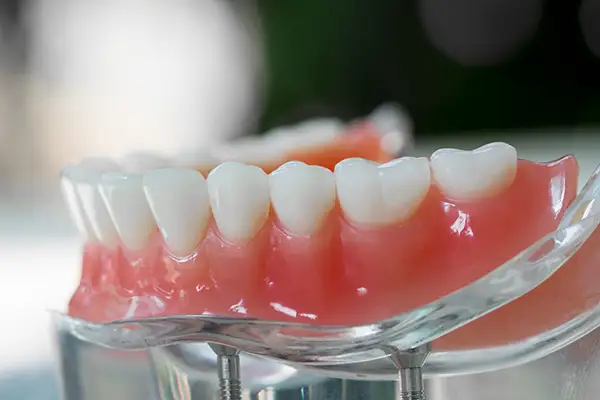The Difference Between All-on-4 and All-on-5 Implants
Posted on 6/2/2025 by Surprise Oral & Implant Surgery |
 Are you missing all of your teeth on your upper and/or lower jaw? If so, you may be a candidate for dental implants to restore your smile and oral function. There are various types of implant-supported dentures, and two popular options are All-on-4 and All-on-5 implants. Both procedures offer numerous benefits, but there are some key differences between them. Are you missing all of your teeth on your upper and/or lower jaw? If so, you may be a candidate for dental implants to restore your smile and oral function. There are various types of implant-supported dentures, and two popular options are All-on-4 and All-on-5 implants. Both procedures offer numerous benefits, but there are some key differences between them.
What are Dental Implants?
Dental implants are small, titanium posts that are surgically inserted into your jawbone. They act as artificial tooth roots, providing a strong and stable foundation for your new teeth. Over time, the titanium fuses with your jawbone, creating a permanent bond.
What is All-on-4?
All-on-4 is a dental implant procedure that uses four implants to support a full denture. The implants are strategically placed in your jawbone at an angle, maximizing their stability and support. Two implants are placed in the front of your jaw and two are placed in the back, angled towards the back of your mouth. This angulation allows for the use of longer implants in the back of the mouth, where bone density is often lower. This eliminates the need for bone grafting in many cases.
The All-on-4 procedure is a minimally invasive option with a shorter treatment time than traditional implant procedures. The denture is usually attached to the implants on the same day as the surgery, allowing for immediate function and aesthetics.
What is All-on-5?
All-on-5 is another implant-supported denture procedure that uses five implants to support a full denture. Similar to All-on-4, the implants are strategically placed in your jawbone, with two in the front and three in the back. The additional implant in the back of the mouth provides even greater stability and support for the denture.
All-on-5 is also a minimally invasive option with a shorter treatment time than traditional implant procedures. However, the additional implant may require bone grafting in some cases. The denture is typically attached to the implants a few months after surgery, allowing for time for the implants to fully integrate with the jawbone.
Which Option is Right for You?
The best option for you will depend on your individual needs and oral health. Factors to consider include bone density, bite strength, and overall health. Your oral surgeon will discuss your options with you and help you choose the best procedure for your situation.
Benefits of All-on-4 and All-on-5 Implants
Both All-on-4 and All-on-5 offer numerous benefits over traditional dentures, including:
| • |
Improved stability and retention: The implants provide a secure foundation for your dentures, eliminating the need for adhesives and the worry of slipping or clicking. |
| • |
Enhanced chewing ability: The implants allow you to bite and chew with greater force, making it easier to enjoy a wider variety of foods. |
| • |
Improved bone health: The implants stimulate the jawbone, preventing bone loss and preserving facial structure. |
| • |
Increased confidence: Having a secure and natural-looking smile can boost your confidence and self-esteem. |
| • |
Improved speech: Implants can help to improve speech clarity, as traditional dentures can sometimes slip and affect pronunciation. |
| • |
Long-lasting results: With proper care, dental implants can last for many years, even a lifetime. |
Restoration Dentistry: A Holistic Approach
Whether you choose All-on-4 or All-on-5 implants, it is important to find an experienced and qualified oral surgeon who specializes in implant dentistry. They will work with you to develop a comprehensive treatment plan that addresses your individual needs and goals. Remember, dental implants are a significant investment in your oral health and well-being. Choosing the right procedure and provider will ensure that you achieve the best possible outcome and enjoy a lifetime of improved oral function and aesthetics.
Next Steps:
If you are considering All-on-4 or All-on-5 implants, the next step is to schedule a consultation with a qualified oral surgeon. During the consultation, the surgeon will perform a thorough examination, discuss your options, and answer any questions you may have. They will also develop a personalized treatment plan that outlines the steps involved in the procedure and the associated costs.
Remember, you deserve a smile that you can be proud of. Dental implants can help you achieve that goal and restore your oral health and function. |
|
